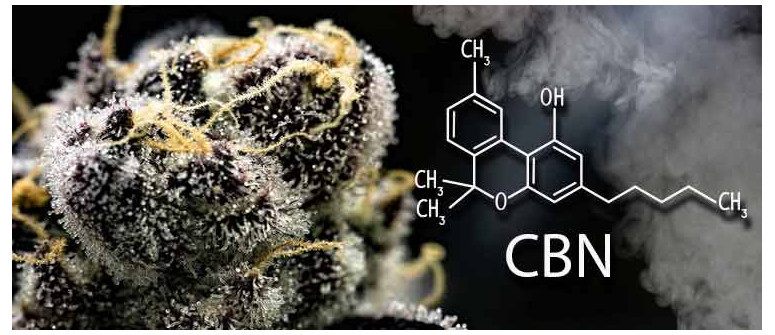What is cbn (cannabinol)?

CBN, or cannabinol, is a cannabinoid that is showing a boat load of medicinal promise. The compound has been studied in decent depth, and is showing potential for fighting conditions such as cancer, epilepsy, appetite loss, and inflammation.
TABLE OF CONTENT
- 1. Understanding the cannabinoid family tree
- 2. What is cannabinol (CBN)?
- 3. What does CBN do?
- 3a. CBN and inflammation
- 3b. CBN and appetite
- 3c. CBN and glaucoma
- 3d. CBN and seizures
- 3e. CBN and pain
- 4. Can CBN get you high?
- 5. What's the difference between CBD and CBN?
- 6. Is CBN legal?
- 7. What CBN products are available?
CBN is a lesser-known cannabinoid found within cannabis and hemp. But just because CBN is not as talked about doesn't mean it has nothing to offer. Although not as famous is its CBD and THC cousins, CBN has a significant role to play in when interacting with our endocannabinoid systems. So what is CBN and what makes it worth knowing about? Let us show you.
UNDERSTANDING THE CANNABINOID FAMILY TREE
If you want to understand CBN, you'll need to get familiar with how cannabinoids are connected to one another in their chemical family tree. First off, rather than just two or three, there are a dizzying 113 different cannabinoids (estimated) found in the cannabis plant. Many of these are found in trace amounts. All of them, including CBN, derive from three main cannabinoid lines: CBCA, THCA, and CBDA—which in turn stem from cannabigerolic acid, CBGA.
WHAT IS CANNABINOL (CBN)?
CBN is only present in trace amounts in growing or freshly harvested cannabis. However, as cannabis begins to age, CBN starts to appear in larger amounts. More specifically, as THCA is exposed to oxygen, over time, it loses hydrogen molecules and oxidises. Through this process, it becomes CBNA, which turns into CBN once exposed to heat or UV light. So, if you want your cannabis to be more CBN-heavy, let it age a few weeks longer than you normally would.
WHAT DOES CBN DO?
But why would you want your cannabis to contain more CBN? What does it do, exactly? As it turns out, studies have shown it to have several potential uses in fighting health issues and promoting wellness. Amongst other benefits, it has shown potential to fight inflammation, increase appetite, quell pain, alleviate glaucoma, and even minimise seizures.
CBN AND INFLAMMATION
Research on CBN has come in slowly, but important work has been done in the past few years. One study performed in 2016, for instance, tells us a good amount about CBN's potential to fight rheumatoid arthritis. Observing a group of rodents, researchers found that CBN, along with CBD and CBC, caused a significant reduction in collagen-induced arthritis. Even better, it's also been proven to reduce keratinocyte production, which is known to cause skin and heart lesions in those with psoriasis.
CBN AND APPETITE
There is not much research into CBN and appetite, but what has been done shows potential. In a 2012 rodent study, researchers found that the appetite of adult male rats significantly increased upon being treated with CBN. In addition to eating more, they ate quicker, and continued to do so for longer periods of time. This was the first time a study has been able to show these sorts of results.
CBN AND GLAUCOMA
With there being a correlative relationship between glaucoma and hypertension, CBN’s potential to tackle the latter is cause for additional study. To be more specific, CBN, along with THC, has been shown in numerous studies to actively lower intraocular pressure. Elevations in this pressure are the main indicator of ocular hypertension, which, in turn, is a major risk factor for glaucoma. Cannabinoids have been shown to fight glaucoma in past studies, and this research in CBN helps further our understanding.
CBN AND SEIZURES
Amongst all this, CBN has even been shown to act as an anticonvulsant (at least in mice, anyway). Back in 1974, researchers fed a group of mice an emulsion of CBN and sesame oil, along with testing out THC and CBD with the same emulsion. In that trial, all three were found to effectively prevent seizures, with peak efficacy coming after about two hours. Given the age of this study, we should make a point of encouraging new research into the topic. However, the fact that they were able to make a connection back then shows there could be some truth to it.
CBN AND PAIN
Lastly, as recently as 2019, studies have heavily suggested CBN can influence pain perception. The latest discoveries were made while researchers studied nerve growth factor-induced masticatory muscle sensitisation in female rats. In the study, the researchers found a 1mg/ml dose of CBN was able to decrease this sensitisation and ease their pain. This wasn't the only recorded instance of CBN demonstrating pain-fighting capabilities either. In fact, going as far back as 2002, pharmacology researchers at Lund University Hospital found that CBN and THC activated the same pain pathways in the body.
CAN CBN GET YOU HIGH?
Now that we've discussed the apparent versatility of CBN, we're sure you have another question: Can it get me high? The short answer is no, it certainly influences a cannabis high. This influence has to do with the supposed sedative effects of CBN.
CBN has been found to enhance the drowsiness caused by THC when consumed in combination. Along with that, in this same combination, it's been shown to enhance the euphoria caused by consuming THC. Contrary to what many sources say, the sedative effects haven't been shown to occur with CBN in isolation.
WHAT'S THE DIFFERENCE BETWEEN CBD AND CBN?
Yes, they share the first two letters in their acronym, but CBD and CBN aren't quite the same. While they're both cannabinoids, CBN comes from THCA, and substantial amounts only result from ageing. CBD, on the other hand, comes from CBDA, and plants can be selectively bred to feature high CBD content.
Diving in deeper, they both interact with the brain, but neither will get you high like THC does. That said, they could potentially fight some of the same issues, and both are known to exert minimal adverse side effects.
IS CBN LEGAL?
The legal status of the main two cannabinoids is clear, but what about CBN? Well, it's murkier than you'd expect for something that can't get you stoned. Since it wasn't listed by the United Nations’ Single Convention on Narcotic Drugs during classification in 1961, or in their Convention on Psychotropic Substances in 1971, it's legal in an international sense.
If we're talking about the US, though, we have to consider that cannabis in general is classified as an illegal substance on a federal level. From there, it depends on the legality of cannabis in each state, whether it's medically or recreationally available, or whether it's only decriminalised. Generally, as long as the THC content in the product is below 0.3%, CBN and CBD have an identical legal status.
WHAT CBN PRODUCTS ARE AVAILABLE?
At the moment, while there are CBN products available here and there, the supply is rather limited. This is mainly due to the difficulty involved in isolating the compound. However, we're sure future research and the rise of new technology will lead to CBN becoming more and more available.
Working with what you've got, there are a couple ways you can harness the effects of CBN. With flower, all you have to do is let it age to enhance the cannabinol content. If you're using a vape, you can make sure to do so at certain temperatures, specifically around 185ºC (365ºF). In the meantime, keep an eye out for developments, and get ready for a new wave of CBN products to hit the shelves.
.jpg)


.jpg)
